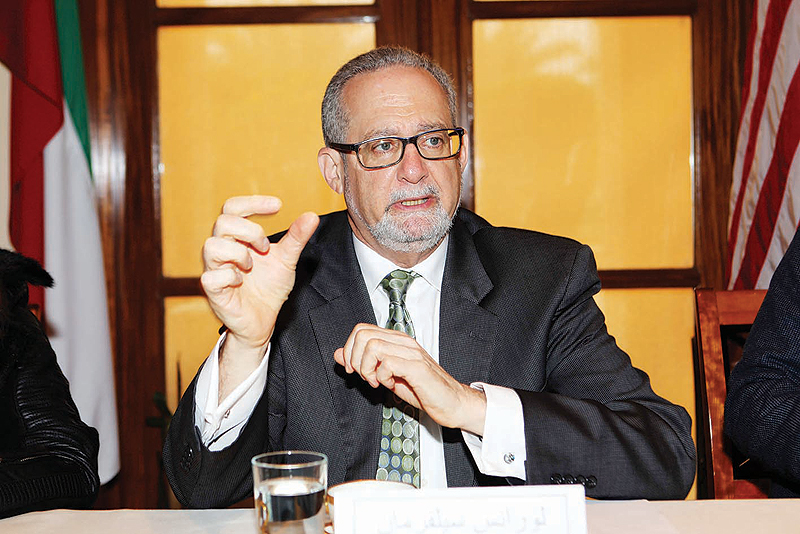Silverman hails resumption of direct flights, Kuwaiti humanitarian aid

KUWAIT: Kuwait and the United States share similar agendas in the Middle East, including efforts to preserve Gulf unity, US Ambassador to Kuwait Lawrence Silverman said yesterday. He was speaking during a roundtable at the US Embassy on the Kuwait-US strategic dialogue with US Secretary of State Mike Pompeo that will kick off tomorrow. Issues of regional importance and bilateral cooperation between the two countries will be the main subjects to be discussed, including defense and security, economy, education and trade.
"We had a similar dialogue in 2016 and 2017 - it's a process. What we are trying to do is strengthen our relations in all aspects, including making travelling from Kuwait to the US easier. Just last week, Kuwait Airways was able to resume direct flights to New York City, which was the result of the two governments' continuing commitment to make the American and Kuwaiti people reap the practical benefits of our strategic relations," he said. Silverman also revealed "Kuwait's desire" to set up an American-staffed custom checkpoint at Kuwait International Airport, similar to the one in Abu Dhabi. Kuwait's request in this regard is currently under discussion, he said.
Silverman said Pompeo's visit is part of his tour of the Middle East which included Jordan, Iraq and Egypt, and underscores America's interest in the region, including the GCC countries. Silverman reiterated his country's commitment to regional security and the importance of relations between the two countries as well as look for ways to curb Iran's destabilizing practices in the region and find solutions to regional problems including Yemen. "The unity of the GCC is extremely important; it will be highlighted in this trip. The secretary is here to find and explore solutions to regional conflicts and find solutions to the negative activities of Iran," he said.
Silverman said the US president and his secretary of state appreciate the efforts made by Kuwait, not only in the diplomatic sphere, but also Kuwait's humanitarian contributions to refugees as a major effort for the stability of the region. "We would like to thank HH the Amir for his humanitarian work - the Amir does not need to do what he does. It's not only the right thing to do in terms of humanitarian assistance, but also a major investment for stability in the region," he added.
Silverman pointed out that military agreements between Kuwait and the US are aimed at enhancing the capabilities of the Kuwaiti army and training its personnel. Military contracts, according to Silverman, are due to be signed during the dialogue. He said there have been deals on F18 aircraft and M1A2 tanks, indicating that the two sides will discuss the delivery of the military equipment in the coming few years.
Silverman reiterated America's commitment to hosting the GCC-US summit in Washington, expected to be held in the first quarter of this year as an annual event to discuss many issues, including ending the Gulf crisis, strengthening trade and economic relations and combating terrorism and drying up its sources. "We had committed to host the summit - Saudi Arabia hosted the May 2017 summit. We want to see the end to the Gulf dispute, along with other issues such as fighting terrorism, stopping terrorist financing, creating a real structure to maximize the defense against ballistic missiles and also enhance our economic and trade relations," he said.
The envoy also confirmed the attendance of Kuwait at a ministerial meeting scheduled to be held in Warsaw in mid-February. "An invitation was sent to Kuwait and they confirmed that they are going to attend the ministerial meeting along with 70 other countries. We hope to see the maximum attendance - Iran will be part of the conference, with the hope that it could lead to a change in the behavior of the Iranian regime, but other issues will be discussed too," he added.
On the sanctions against Iran, Silverman said this is only the beginning stage and results will not appear quickly. He pointed out that Iranian oil exports had fallen from 2.7 million barrels per day to less than 1 million, hoping to see results on the ground soon. "The economic sanctions on Iran reduce the Iranian government's support of terrorist groups, including Hezbollah in Lebanon, which by its practices harms the economy of Lebanon. So sanctions have an effect - as the history of sanctions shows, countries will always claim they are not affected, but they have a great impact on the economy in the long term. I hope the Iranian government will realize the magnitude of the economic difficulties it is putting on itself and its people," he added.
On the Israeli-Palestinian conflict, the ambassador said the US government is keen to revive peace talks, pointing out there is no specific timetable for relaunching negotiations between the two countries. On the US military pullout from Syria as announced by US President Donald Trump, he said it was mainly a tactical decision rather than a strategic one, stressing that the US policy toward Syria has not changed and the elimination of Iranian-backed terrorist groups is still the top priority.
"We want to see a political solution with regards to the Syrian regime. We ask them to comply with UN Security Council Resolution 2254. Some Arab countries have expressed their desire to reopen embassies in Syria, but we disagree with this. If you (the Arab countries) are trying to influence the Assad regime to do what it is supposed to do, we don't believe the reopening of embassies is the right thing to do," he concluded.
By Ben Garcia










